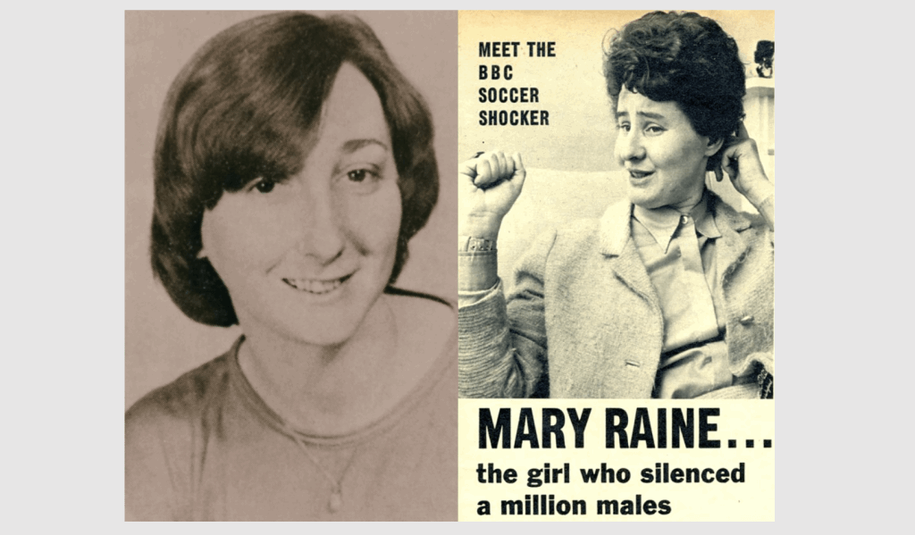News
Female Football Pioneers: Mary Raine and Patricia Gregory
24 March 2020

Patricia Gregory, left, and Mary Raine, right, are two of the original trail-blazers for women in football
In an article that first appeared on bbc.co.uk, we are sharing an edited version of Charles Runcie's wonderfully insightful feature highlighting two truly exceptional individuals - Mary Raine and Patricia Gregory - who were trailblazers for all women working in football:
It’s 1969. Harold Wilson was Prime Minister, Apollo 11 prepared for its historic mission to land men on the moon, the Beatles were top of the charts for 6 weeks with “Get Back” and the average weekly wage was £32. At the end of a decade which changed the world forever, two women working at the BBC were also pioneering change in an area where change was long overdue – sport.
Mary Raine - the first woman to report on sport for the BBC
Mary was obsessed with football from her early days growing up in the North East. At school her housekeeper banned her from having pictures of footballers on her desk and tried to confiscate her football books and magazines, as soccer was not considered “suitable” at a public school.
After university and teaching jobs she joined the BBC in 1966 as a newsroom sub-editor. Though mainly interested in foreign affairs, she was always discussing football with the likes of football correspondents Brian Moore and Bryon Butler in the Sports Department. She was usually asked to write any football stories for the news bulletins.
Following some encouraging words from radio commentator Peter Jones, Mary was eventually sent to report on the Chelsea-Sunderland league game in February 1969 for radio’s Sports Report. Describing the London team’s 5-1 win she became the first woman to report on sport for the BBC. Her broadcast that Saturday afternoon caused newspaper headlines across Fleet Street, favourable reviews both inside and outside BH and even a feature in “Goal” magazine headed “Meet the BBC’s soccer shocker”.
The following season Mary was sent to Wembley to report the FA Cup final for Radio 4’s 6pm news and it caused a sensation. While the Home Service used her report the editor of the Light Programme bulletins on the other side of the Newsroom refused, and used the Sports Units report instead. He told her “I cannot possibly use a report by a woman on the Cup Final”.
To read Mary's story in full, including her historic first ever football commentary, click here.
Patricia Gregory and the Women’s FA
Around the same time Patricia was also starting to make her mark in football, in similar unsung fashion to Mary but in a different area of the game. Like many others she’d been excited by England’s 1966 World Cup victory, then the FA Cup win by Tottenham the following season. Watching Spurs parade the famous trophy around north London she wondered why women couldn’t play “the beautiful game” too. The reason? It had effectively been banned since 1921 by the FA, worried by the attention and the crowds that had followed it back then.
Undaunted, Patricia wrote a letter about women’s football to her local paper and received several replies about playing. Having set up a team, she needed others to play against. “My Dad was quite traditional; he was against me getting involved in all this. However, he completely changed his mind when the local council told me I was not legally able to rent a local pitch for matches against other women’s football teams”. She eventually managed to get a pitch and ended up running both it and a women’s football league. Then in 1969 she was instrumental in setting up the Women’s FA as the game’s governing body.
She was organising all this and overseeing the general expansion of the women’s game while holding down a full-time job as a secretary in the BBC’s Sports Department which she had joined in 1970. Life was hectic. “I used to work at BBC Sport all day, travel to my parents’ home, have my tea then go upstairs to my room and start work on all the league and game’s administrative duties. I also wanted to learn the rules properly, so I enrolled on a referee’s course. We were then told by the FA that any fully qualified women referees could only referee women’s games”.
Despite all these hurdles, Patricia oversaw the growth of the WFA while developing her career firstly with BBC Sport, then joining ITV in 1978 as their first Network Sports Coordinator. “My new colleagues were shocked when I walked into their sports office”, she jokes. “They told me they’d been expecting a man called PAT Gregory!”. She returned to BBC Sport in 1993, ironically the year the FA finally assumed their role as governing body of women’s football, until retiring in 2010.
To read Patricia's story in full click here.
Charles Runcie's article, which first appeared on bbc.co.uk is available in full by clicking on the link here. Charles is a former Head of Sport for BBC English Regions.
Share this article
